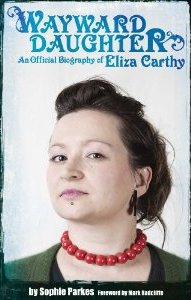Despite any misgivings I may have on folk in general, I certainly finished this book admiring Carthy as a figure of some consequence.
Despite any misgivings I may have on folk in general, I certainly finished this book admiring Carthy as a figure of some consequence.

(Sophie Parkes)
Soundcheck Books – http://www.soundcheckbook.co.uk
This review will begin with something of a confession. I’ve not found Wayward Daughter easy to read, it’s been a slog to finish. Not from any great problems with the way this is written, (there are niggles but I’ll come to that later) but because reading it has pretty much confirmed for once and for all that I have no feel for folk music or its traditions. Rather like being stuck in a dentist’s waiting room centre reading a book on the history of weaving to pass the time, I stuck at it, hoping for a conversion or enlightenment.
But enough of me. I can imagine that this is one of those books that any fan of Eliza Carthy’s work would devour. Despite any misgivings I may have on folk in general, I certainly finished this book admiring Carthy as a figure of some consequence. There’s no doubt that this book should command respect. Rich in detail and anecdote, clearly benefitting from extensive access to the musician and her inner circle and often propelled by a nice, unfussy narrative style, I would wager that this is as definitive a biography as its subject will get for some time. Author Sophie Parkes has such knowledge and enthusiasm for her subject that it would be churlish, not to say stupid for me to question any source or any claim made, so I won’t.
When Miss Parkes uses her clear style to tell the story, it’s a pretty intriguing book. She is adept at letting her characters take the stage. The pace is brisk and well managed and conclusions are clearly and honestly drawn: it has the feel of an old fashioned essay. The strongest sections allow for an adept balance of narrative and interview, and nearly always describe the moments of friction or struggle in Eliza Carthy’s life. Carthy’s trouble with her voice, her first dealings with fame and the relationship that was forged between Nancy Kerr and Eliza Carthy are particularly good. With the relationship between Kerr and Carthy, Miss Parkes is excellent at setting out a narrative based on concise, sometimes terse prompts; balanced between large chunks of interviews from both women. This may seem like a dry, academic – or maybe over-sensible – approach but it works well and is presented sympathetically.
And the honesty of both the subject and her biographer when talking about the vicissitudes of the music business is compelling in itself. Parkes’s frankness can look slightly blunt on the page but it is welcome. No metaphorical allusions here: “As Eliza became more and more dependent on steroids, her appetite increased”, nor here: “The very fact that Nancy and Eliza felt competitive towards each other indicates, however , that they believed the scene at the time could only accommodate one or the other – that there were few places available to young, female professional musicians .”
At times it does feel too much like an essay, though, and Miss Parkes’s attempts to lighten certain chunks of interview or over-compensate with detail (or testimonies from famous Carthy fans) made me harrumph & twist about in a slightly bored frustration. Whilst appreciating that extraneous detail about the colour of a pregnant Nancy Kerr’s dress (purple), or how many GCSE’s Carthy bagged, (10, French a year early) could well be ambrosia for fans, I can’t see how it helps me. Nor do lines like this: (about a tape made of young Eliza playing with her dad, folk legend Martin Carthy). “Perhaps that tape will surface on eBay one day!”
Or perhaps not.
But enough.
A fine musician herself, and a member of a band that this magazine certainly does like, Miss Parkes is what you would call (in the good, non-derogatory, old fashioned sense of the word) a true amateur of her subject. We know her and like her. And she’s done a good job here. I’m not sure I need to recommend it to folk fans. For us outside the Pale, it’s a diverting enough book.
